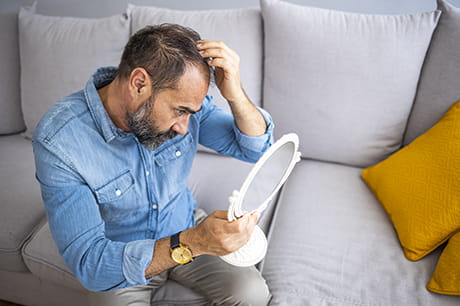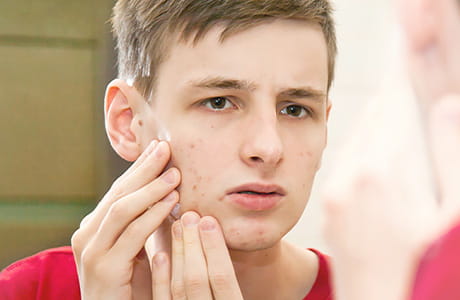Losing hair? It could be androgenetic alopecia.
Your part is gradually getting wider, or your hairline is receding. What can you do about it?
Shedding hair is a normal process: Hair falls out and grows in. In general, it’s normal to lose up to 100 hairs in a day. But when more hair falls out and less grows in, it’s known as alopecia — the medical term for hair loss.
You’ve probably heard of male pattern baldness, but it can happen in women, too. Androgenetic alopecia is the term used for this genetic condition that results in hair loss, regardless of gender. It’s a slow, progressive thinning of the hair and one of the most common causes of hair loss.
Hair loss in men usually starts out with thinning at the temples or crown of the head that can lead to a receding hairline or baldness. Women rarely lose all their hair, but it can get thin, especially along the part and the top of the head.
What causes permanent hair loss?
There are many factors that contribute to androgenetic alopecia in both men’s health and women’s health. Genetics play a big part (how your hair thins can run in your family), but hair loss can be affected by other things, too.
Hormones
Androgenetic alopecia hair loss is linked to hormones called androgens. Both men and women have these hormones that regulate hair growth, among other functions. If the androgen level in hair follicles is too high, it can mean shorter and thinner strands of hair and a delay in the growth of new hair. Low levels of estrogen in women, sometimes present after childbirth and during menopause, are another hormonal contributor.
Chronic medical conditions
Your health has a big impact on every part of your body — including your hair. Several medical conditions can result in hair loss, such as thyroid diseases, ringworm, high fever and diabetes. And in some cases, the medications you use to treat your medical condition can cause you to lose hair as well.
Autoimmune disease
Alopecia areata is a type of alopecia that makes your immune system attack your hair follicles. It usually leaves round bald patches and can happen anywhere on the body.
When should you see a doctor?
Talk to your doctor if you’re upset about your hair loss, but especially if you suddenly lose a lot of hair. There could be an underlying medical condition that’s causing it and needs treatment. If the hair loss isn’t a symptom of a medical condition, your physician may refer you to a dermatologist for further care.
Treatments your doctor may suggest are prescription medications (like minoxidil or various oral medicines) or hair transplant surgery.
What can you do to keep your locks?
Part of healthy aging is taking care of your body — which of course includes your hair. Things you can do to help keep your hair include:
- Vitamin supplements – Biotin is a B vitamin that helps with hair loss. You can get biotin naturally by filling your plate with foods like fish, meat, nuts and seeds, sweet potatoes, broccoli and cauliflower. Not a fan of those foods? You can also take a vitamin supplement. Doctors usually recommend a blend of biotin, vitamin C, zinc and folic acid for the best results. Just make sure you tell your healthcare provider that you’re taking these supplements. They can affect other aspects of your health.
- Scalp massages – Good skin care is important for healthy aging, so don’t forget the skin under your hair. Daily scalp massages can have a big impact. Massaging for about four minutes a day stimulates your hair follicles and promotes hair growth. Even if you don’t see actual growth, you might at least slow or stop active hair loss.
- Give up cigarettes – If you need an excuse to quit smoking, this is a good one. Studies have shown that smoking leads to early hair loss. Some of the toxic substances in cigarettes can damage hair follicles. Smoking also affects your hormones, and as discussed, hormonal imbalance can lead to hair loss.
Some self-care and medical treatment can help if you have androgenetic alopecia. But you may just choose to embrace the way you look with less hair. You can style your hair differently to cover thin spots, wear a wig — or just learn to love your new look.
Next steps:
Eat these 8 foods to get more biotin
Do you have a hormonal imbalance?
Meet Oksana Bailiff, MD





